From Shamkhor to Elizavetpol. Brilliant victories of Russians in Transcaucasia
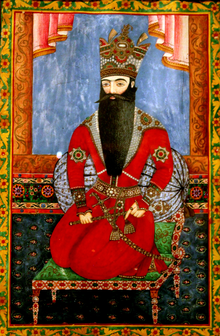
Defeat of Persia in the Russian-Persian War 1804-1813 led to a large-scale territorial repartition in the South Caucasus. According to the Gulistan Treaty, Dagestan, Kartli, Kakheti, Megrelia, Imeretia, Guria, Abkhazia and several Azerbaijani khanates — the Baku, Karabakh, Ganja, Shirvan, Sheki, Cuban and Derbent, as well as part of the Talysh khanate. Such acquisitions of the Russian Empire greatly frightened the ruling circles of Great Britain, who felt a threat to the British positions in the Middle East. Already in 1814, the British envoys to Persia achieved an agreement with the Shah that Persia would not allow any troops through its territory towards India. After that, the British authorities promised to support the shah in the event that Persia began to seek a revision of the Gulustan peace treaty. Of course, the shah agreed. After all, Persia did not leave hopes for revenge and the return of vast territories in the Caucasus and Transcaucasia under its control.
Of course, Feth Ali Shah Qajar would hardly have decided to repeat the war with Russia, if Great Britain had not promised its full support to the Persian Shah. The time for the commencement of hostilities was chosen, from the point of view of the enemies of the Russian state, very suitable. The Decembrist uprising had just been suppressed, the country was impressed by this event, and the officer corps was weakened. British advisers suggested to Feth Ali Shah and heir to the throne of Shahzade Abbas Mirza that this is a great time to strike at Russian positions in Transcaucasia.
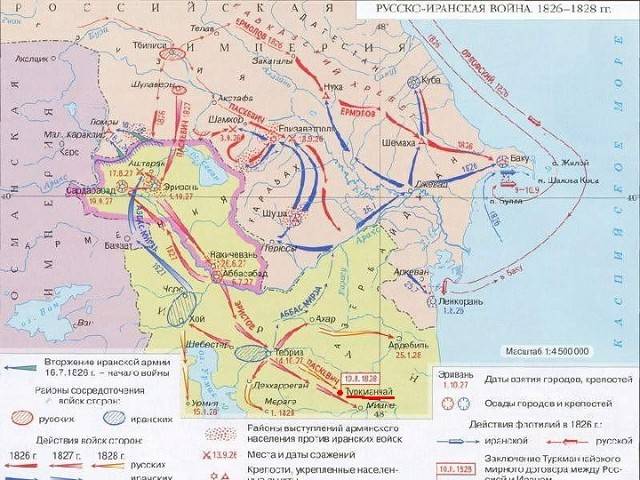
19 (31) July 1826, without a declaration of war, an impressive Persian army crossed the border of the Russian Empire and entered the territory of the Karabakh and Talysh khanates. The Russian-Persian border in these areas was guarded by guards recruited from local residents - Azerbaijani Turks, Talyshs and Persians, who chose to immediately go over to the side of the Shah's troops or, at best, simply surrender. The Persian command planned to deliver the main blow to Georgia, taking Tiflis and pushing the Russian troops over the Terek. Therefore, it was precisely this direction that was chosen as a priority, but part of the troops was also sent to the Mugan Steppe - they were assigned the task of preventing the arrival of Russian reinforcements from the territory of Dagestan. The Persian Feth Ali Shah was confident of a fairly quick victory, since he was counting on the support of the Azerbaijani khans and the Muslim population of Transcaucasia and the North Caucasus.
By this time, the general command of the Russian troops in the Caucasus was carried out by General of Infantry Alexei Petrovich Yermolov - an experienced military leader who participated in many wars, including the Patriotic War 1812 of the year. Yermolov was known for his hatred of Persia and dreamed of the destruction of the Persian empire. He retained such an attitude to the Persian state from the time of the 1796 Dent campaign, in which he participated in the 20-year-old young officer. When the Persian troops began to advance towards Shusha, Yermolov ordered the Russian troops stationed in the Shushi region in no way to lose their positions.
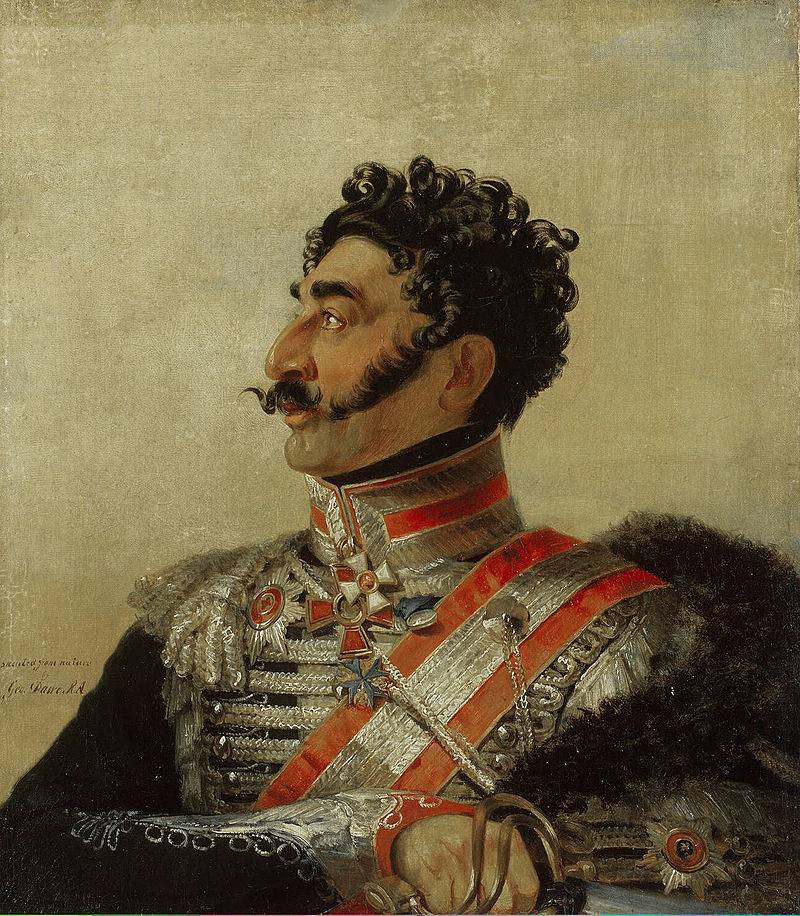
The Russian army on the territory of the Karabakh Khanate was commanded by Major General Valerian Madatov. By origin a Karabakh Armenian, Madatov began serving in the Russian imperial army as early as 1799. In fact, at birth his name was Growth. In 14 years he left his paternal home in Karabakh and got to Astrakhan, where he was a student of the regimental conscript. When the embassy of Armenian meliks led by Jumshud Shakhnazarov passed through Astrakhan, he jumped up to the embassy delegation and ended up in St. Petersburg. He was granted the nobility and enrolled in the Guard - in the Transfiguration Regiment. By the time the Russian-Persian war began, Madatov had 27-year-old service in the Russian army, participated in the 1812 Patriotic War of the year, in the Russian-Turkish war and in the pacification of the Caucasus.
22 August (3 September) Madatov received an order from Yermolov to advance towards the Persian troops stationed in the area of the River Taus. As a result of a brief battle, the Russians knocked out the Persians from the positions occupied by the latter, after which Ermolov ordered Madatov to move toward Elisavetpol and gave him a battalion of the Kherson Grenadier Regiment to help him. 25 August (6 September) 1826, Madatov's detachment moved to the side of Elisavetpol. The squad included the 5 company of the Georgian regiment, the 1 battalion of the Kherson grenadier regiment, the 3 company of the 41 th Egersky regiment, the Cossack detachments, the Georgian and Azerbaijani police. In service with the Russian troops were 12 artillery shells.
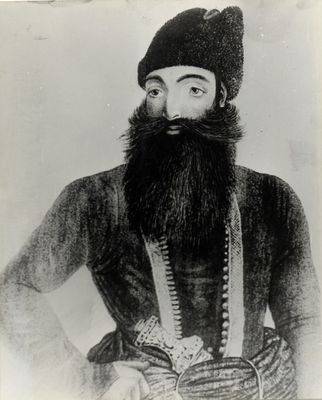 Upon learning of the advancement of Russian troops, the Persian commander-in-chief, Crown Prince Abbas-Mirza (in the image), sent the 10-thousandth army under the command of his son Mohammed towards Elisavetpol. 1 (13) of September, the Erivan sardar Amir Khan, allied to the Persians, also arrived in time to help Mohammed, under the command of which were thousands of 4 soldiers and 2 artillery pieces. 3 (15) September 1826, in the area of the village of Shamkhor, a battle took place between the Russian detachment and the Persian army.
Upon learning of the advancement of Russian troops, the Persian commander-in-chief, Crown Prince Abbas-Mirza (in the image), sent the 10-thousandth army under the command of his son Mohammed towards Elisavetpol. 1 (13) of September, the Erivan sardar Amir Khan, allied to the Persians, also arrived in time to help Mohammed, under the command of which were thousands of 4 soldiers and 2 artillery pieces. 3 (15) September 1826, in the area of the village of Shamkhor, a battle took place between the Russian detachment and the Persian army.Mohammed arranged the Iranian troops in a traditional battle formation in the form of a crescent, curved toward the enemy. In the center of the Persian troops were part of the regular infantry - Sarbazov, the flanks were covered by irregular cavalry - the ghouls, and behind them were placed the falcons and artillery pieces. The ratio of numbers clearly did not speak in favor of the Russian detachment. Nevertheless, Major General Madatov did not lose his head. He ordered the attack on the Persian positions, starting with artillery preparation. The Cossacks, the Georgian and Azerbaijani militia hit the flanks of the Persian location, and the infantry went to the bayonet at the Sarbaz, located in the center of the Persian "crescent."
With a decisive blow, the Russians succeeded in bringing complete turmoil into the ranks of the Persian army. Georgian and Azerbaijani militia defeated the flanks and switched to the remnants of the infantry. The outcome of the battle for the enemy was bleak - the Persians killed about 2 thousands of people, and in the squad of Madatov there were only 27 people dead. The elite units of the Shah Guard virtually ceased to exist - all their sarbazes and officers died under the blows of the Russian cavalry. Eyewitnesses of the events recalled that the space from Shamkhor to Elizavetpol was completely littered with the corpses of Persian soldiers. The defeat at Shamkhor was the first wake-up call for the Persians, but Abbas-Mirza did not draw proper conclusions from him.
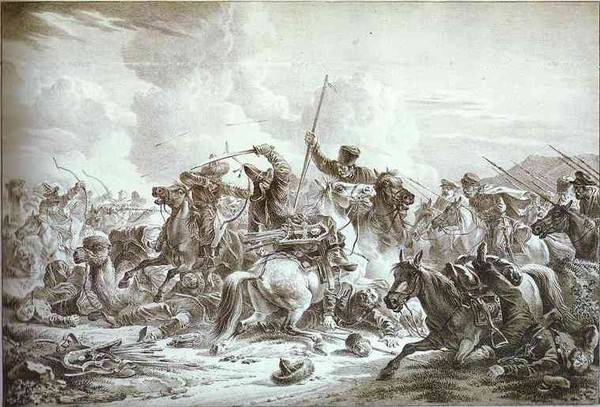
Since the Battle of Shamkhor cannot be considered in isolation from the larger-scale battle of Elisavetpol, we will briefly describe it too. On September 10, General of Infantry Ivan Fyodorovich Paskevich arrived in the area of Elisavetpol. He was entrusted with the overall command of the troops, formally subordinate to General Yermolov. Shortly before the events described, Paskevich received an order to lift the blockade from Shushi, for which he advanced at the head of the Russian troops towards the city. For ease of management, Paskevich brought the troops into the 13 half battalions. Shortly before the performance in the direction of Shushi, two local residents arrived at the location of the Russian troops - Armenians, who reported that the Persian army under the command of the heir to the Persian throne Abbas Mirza was moving towards Elisavetpol. It was impossible to delay, and Paskevich ordered the troops to meet the Persians. In 7 versts from Elisavetpol, Russian and Persian troops met.
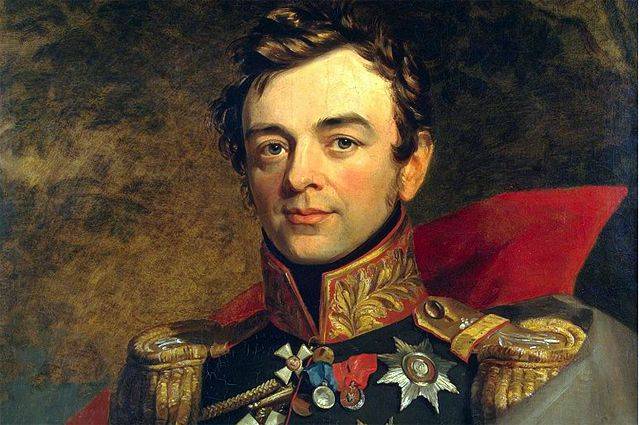
The order of the Russian troops looked like this. The first line (shock columns) included the 4 half battalion from the rangers and riflemen of the Shirvan regiment with 12 artillery guns. The second line consisted of 4 half battalion of carabinieri and grenadiers of the Georgian regiment. The first and second lines were commanded by Major General Madatov. The Nizhny Novgorod Dragoon Regiment entered the third line, and the reserve - the 3 half-battalion of the Kherson Grenadier Regiment with the 6 artillery guns. The front line flanks covered the 2 Cossack regiment, the Georgian and Azerbaijani militia units. These forces, to put it mildly, were clearly not enough to inflict a crushing defeat on the large Persian army. But as it turned out, for the Russian soldier nothing is impossible.
The Persian army in comparison with the Russian army was just huge - it included 20 thousands of people in the detachments of the ghouls - the irregular cavalry, and 15 thousands of sarbazov - regular infantrymen. The Persian armies were armed with 25 artillery guns and an even greater number of falconets, so it cannot be said that the Russian army surpassed the Persians in firepower. In the center of the Persian construction, Abbas-Mirza deployed infantry, and along the flanks - on the 6 battalions of sarbazov and cavalry units. The artillery was also placed in the center - 18 guns, several guns were distributed across all lines, and behind the infantry and the right flank they placed falcontates. The general command of the Persian army was carried out by the successor Abbas-Mirza, the right flank was commanded by his son Mohammed, and the left flank by the son-in-law Abbas-Mirza Allayar-khan.
The immediate collision of the Russian and Persian troops was preceded by artillery preparation. Under cover of artillery fire, the Persian sarbaz of the center and the left flank moved forward and, coming almost close to the positions of the Russian army, began a rifle fire. On the left flank, the few Cossacks and the Azerbaijani militia began to gradually step back. However, the situation was saved by the reserve forces of the Russians - the grenadiers and the dragoon division. Paskevich ordered the Shirvan, Georgian and 41 Eger regiments to launch a counter-offensive, and sent a division of the Nizhny Novgorod Dragoon Regiment to support. As a result of such a powerful onslaught, the outnumbering Persian infantry wavered and began a disorderly retreat. Simultaneously, the Persian artillery ceased fire and began to retreat.
On the right flank, Paskevich sent the 3 half-battalion of carabinieros who saved the situation and strengthened the 2 position with the mouth of the Kherson grenadier regiment and the 1 division of the Nizhny Novgorod Dragoon regiment. Under the impact of the Carabineers, the Persian infantry of the right flank began to retreat into the mountains, after which Paskevich sent additional forces to the right flank - the 2 half battalion of the Kherson Grenadier Regiment. The retreating Persians tried to gain a foothold in the heights, but were soon forced to surrender.
The defeat of the troops of Abbas-Mirza was crushing. Despite multiple numerical superiority, the Persian troops were completely defeated and scattered across the surrounding territory. A Russian squad captured 2 Persian camps, 4 banners, 1100 Persian soldiers and officers were captured. The loss of the Persian army amounted to about 2 thousands of people killed and wounded - and this despite the fact that the Russian detachment lost all 46 people killed and 249 people wounded. The commander-in-chief, Prince Abbas-Mirza, with his confidants, personal guards and artillery, fled across the Araks River. The remnants of his army scattered around the neighborhood, not representing any threat to the Russian troops. Unfortunately, the Russian command could not take advantage of such an excellent result. Although Paskevich originally proposed to attack Tabriz and seize the territory of Southern Azerbaijan, in the end, they decided to abandon this idea, since Russian troops were in acute need of supplies.
For the victory under Elisavetpol, General Paskevich was awarded a gold sword adorned with diamonds, with the inscription: “For the defeat of Persians at Elisavetpole”. Major-General Madatov, the hero of Shamkhor, was not left without an award — he was promoted to lieutenant-general. In fact, the Battle of Shamkhor contributed to a radical change in the Russian-Persian war and the expulsion of the Persians from the territory of the Russian Empire. Although the war continued for a long time, the Persians no longer posed a serious threat to the Russian troops and were defeated after defeat.
Information